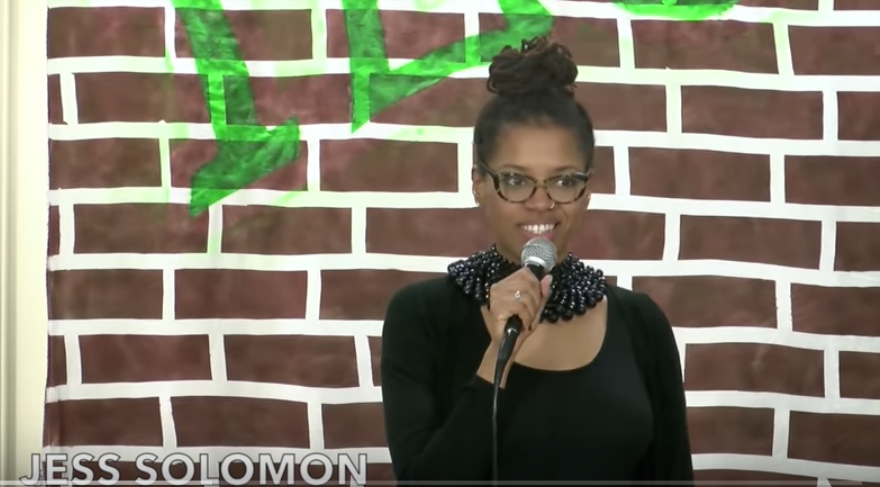Learning to Fight Oppression, One Joke at a Time

Nine brown and black queer and trans folks are gathered in the living room of a group house in Northwest Washington, D.C. They sit facing the doorway of the dining room, where a mic stand creates a makeshift stage. This is the last of their six Sundays together learning the basics of "life affirming" stand-up comedy through silly warmups, writing exercises and the development of their own five-minute sets.
The group calls itself In Laughing Color (ILC). On Thursday and Friday students and co-producers Chelsea Shorte, Griffin Moore and Richael Faithful will do two "graduation" shows called "In Laughing Color: For Queerky Folk Who Considered the Mic When Comedy Central Wasn’t Enuf." These shows will close out the second ILC workshop; the first ended with a sold-out performance in March.
Co-producer Shorte is no stranger to stand-up comedy. Over the past five years she's shared stages with comedians such as W. Kamau Bell and "Daily Show" host Trevor Noah. Faithful and Moore were new to the stage. (You may recognize Faithful from my recent article about her work as a street shaman.)
Moore, who uses the pronoun "they," says their interest in comedy came after a bad break up. “I came out of a relationship a couple of years ago and was watching all of the stand-up I could find to keep myself afloat,” they tell me when I sit down with the three producers and several participants after class. Moore brought in their friend Faithful to co-produce and Faithful, who uses the pronoun "ze," enlisted Shorte since she actually had comedy experience. "I had only heard of one [comic] who was queer and of color," says Faithful of Shorte. "We ran into each other at the farmer’s market." To gentle chuckles Shorte chimes in, "The place to meet socially conscious lesbians!"
ILC isn’t the first workshop of its kind. The producers modeled it after Brouhaha, a similar group in Oakland. "We wanted it to be people of color and queer and trans,” in D.C., says Moore. “We wanted it to be life-affirming, something that would be for us and about us, and not stupid and fucked up."
“Life-affirming” comedy is central to what ILC tries to do. On their Facebook page, the three explain that the workshop creates "safe-space" and "anti-oppressive" performances. Their humor "assumes our complexity. It is funny without making fun of people, particularly not making fun of already marginalized people or experiences."
Anthony Oakes will graduate at this week’s showcases. He’s a writer with an English degree from Winston Salem, North Carolina, but he works in a beauty salon. "[Comedy is] pretty much what I do all day," he says of his day job.
ILC student Shilpa Joshi took the workshop because she was tired of attending stand-up shows where she had to walk out because she or someone she was with was offended by the material. "I’m really into stand-up as an art form," she says. "This was the natural next step for me."
Abigail Sewell, another participant, is a sociology professor and an experienced slam poet who has always considered her alter ego to be a stand-up comedian. After a bad improv class experience in Atlanta, she committed to traveling to D.C. each weekend from Philadelphia to be part of ILC. The Atlanta class was "way too heteronormative," she explains. "I was one of two people of color. It was in a part of town that was newly becoming gentrified. They were making fun of the places and the people."
Sewell's set is about the night she landed in jail 10 years ago. "Do you think there’s some potential in this for it to be funny?" she recalls asking the group. "The only part of that story that was funny was that I ended up in jail with a woman who used ketchup for facial make up. The entire [joke] is about ketchup."
Material at the first ILC "graduation" show ranged widely, from Moore’s routine about OkCupid, to a student's about coming out, to Faithful’s about biking around D.C. "It went against every black survival instinct that I had," Faithful jokes. This week’s showcases are likely to be just as diverse, and the group has added an extra night to accommodate all of the interest.
"I don’t want to be alone," says Shorte of what she wants to achieve with ILC. "I don’t want to be the only black queer woman or only woman or only queer at an open mic. I want us to inspire people to change comedy, to create a little army of black and brown trans and queer people to infiltrate this cis het white boys club and make everything more loving."
